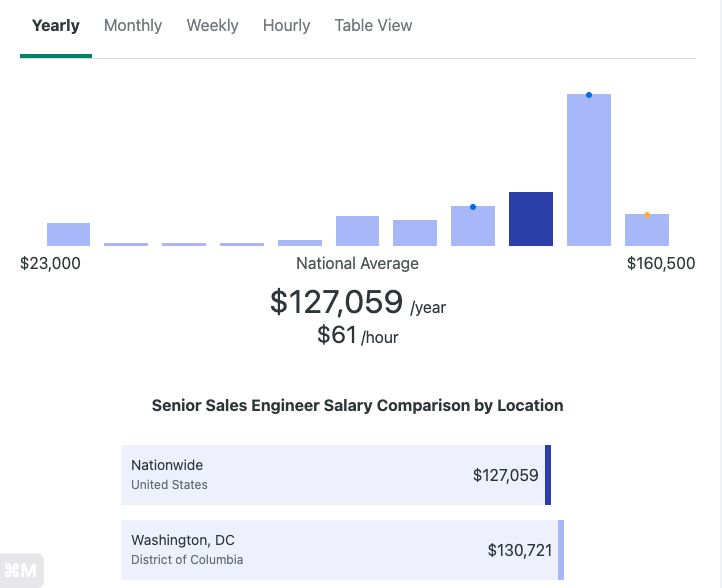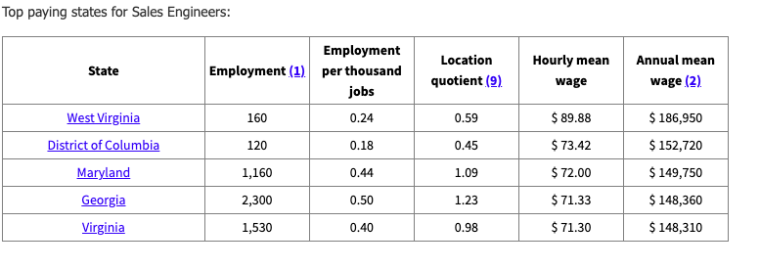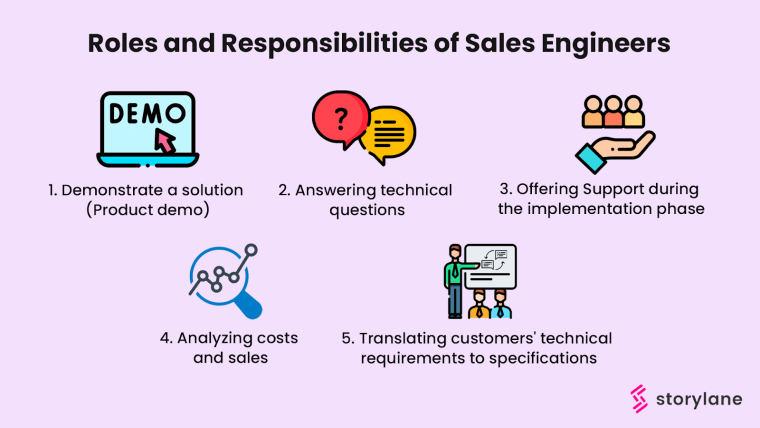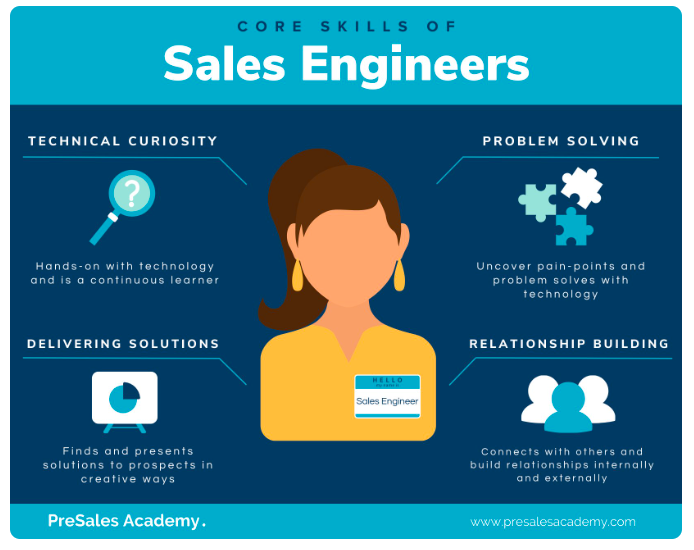The rise of complex technological or scientific product markets in recent years has created a new, high-paying career called a sales engineer. They play a vital part in connecting these products with potential customers.
If you’re curious about the opportunity of getting paid to blend your technical skills with your ability to connect with people, the journey to becoming a sales engineer might captivate your interest.
This article takes a closer look at what it takes to become a sales engineer, outlining the steps involved and helping you weigh whether the journey is right for you.
Sales Engineer in a Nutshell: Should You Pursue a Career in It?
When it comes to the role of a sales engineer, you’ll find yourself at the intersection of technology and customer relationships. Your primary responsibilities involve working closely with sales teams to grasp customer requirements and then offering tailored technical solutions to address those needs.
Education-wise, a bachelor’s degree in a relevant field can be beneficial, but practical and communication skills are equally crucial.
This career path often offers room for growth, where you might start as a junior sales engineer and progress to senior or even managerial positions over time.
In terms of salary, sales engineers can earn a competitive income that varies based on factors like experience, industry, and location.
For those interested in the idea of combining technical know-how with interpersonal aptitude, the role of a sales engineer might hold substantial appeal.
If you’re eager to learn more about this profession, delve into the rest of this article where we explore the details of being a sales engineer and whether it’s a journey worth embarking upon.
Key Takeaways for Prospective Sales Engineers
- Sales engineers bridge technology and customers, explaining complex concepts clearly.
- A bachelor’s degree in engineering or a related field is common, but it depends on the field, and experience and interpersonal skills matter too.
- Earnings can be great, influenced by experience, location, and industry.
- The job outlook is positive, with growth expected due to increasing product complexity.
- Sales engineers find fulfillment in problem-solving and customer relationships.
- If you’re tech-savvy and enjoy connecting with people, sales engineering could be a rewarding career choice.
What Does a Sales Engineer Do? Responsibilities Explained
Sales engineers are like the bridge that connects technology and customers. They wear several hats to ensure seamless interaction between complex technical solutions and the unique needs of clients. Let’s delve into the core responsibilities that define this role:
Understanding Customer Needs and Collaborating with Sales Teams
A significant part of a sales engineer’s role involves working closely with sales teams to understand the specific requirements of potential clients. This means actively listening to customer concerns and questions, and then collaborating with your sales counterparts to offer tailored solutions. It’s your job to translate technical features into real benefits that align with the customer’s needs.
Conducting Product Demonstrations
Sales engineers often find themselves in the spotlight, showcasing how a product works and demonstrating its value to potential customers. This requires not only a deep understanding of the product’s technical aspects but also the ability to communicate its benefits in a way that’s easy for non-technical individuals to grasp.
Providing Technical Support
Once a sale is made, the role of a sales engineer doesn’t end. You will likely still be the go-to person for any technical queries or concerns the customer might have. This involves troubleshooting issues, addressing questions, and ensuring the customer feels confident and supported in their decision.
Tailoring Solutions to Customer Needs
Every customer is unique, and their challenges vary. A successful sales engineer knows how to take a one-size-fits-all product and tailor it to the specific needs of each customer. This requires creativity, problem-solving skills, and a thorough understanding of both the product and the industry or the customer’s business.
These responsibilities showcase just a glimpse into the many sides of the role that sales engineers play in the business landscape. If you’re curious about the day-to-day tasks and challenges they face, read on to gain a more comprehensive understanding of what it means to be a sales engineer.
Education & Skills Needed to Become a Sales Engineer
Becoming a sales engineer demands a blend of technical understanding, people skills, and industry knowledge. Here’s a breakdown of the education and skills that can set you up for success in this role:
Educational Background
While there’s no one-size-fits-all degree for becoming a sales engineer, a bachelor’s degree in a field related to engineering, computer science, technology, or a specific technical industry can provide a solid foundation. Engineering disciplines like mechanical, electrical, or software engineering can be particularly advantageous.
However, it’s not just about the degree; practical skills and real-world experience count just as much.
Technical Knowledge and Engineering Principles:
A sales engineer must be knowledgeable about the complexities of the products they are selling. This doesn’t imply that you must be a skilled programmer or engineer, but a firm understanding of the underlying technical ideas is essential. It is easier to interact with potential customers and allay their concerns if you are aware of how a product operates and its possible uses.
Strong Sales and Communication Skills:
Effective communication is at the core of the sales engineer’s responsibilities. It will be necessary for you to be able to communicate clearly in both technical and non-technical situations because you will be interacting with both groups of people. Active listening abilities, empathy, and the capacity to establish connections with clients will help you stand out in this position.
Industry Familiarity:
Understanding the field you work in is a great advantage. Understanding the difficulties and requirements of healthcare professionals gives you an advantage, for example, if you are marketing software solutions to the healthcare industry. Your pitches and solutions will be more compelling and relevant if you are knowledgeable about the industry.
Certifications and Training:
While not always necessary, certain certifications can bolster your credibility. Depending on the industry, certifications like Certified Sales Professional (CSP) or technical certifications related to the products you’re selling can demonstrate your commitment to both sales and technical excellence.
Problem-Solving and Adaptability:
Sales engineers often encounter unique challenges with each customer. The ability to think on your feet, devise creative solutions, and adapt to different scenarios is incredibly valuable. Problem-solving skills help you address customer concerns and tailor solutions effectively.
In the realm of sales engineering, a combination of technical acumen, interpersonal skills, and industry knowledge can truly elevate your career prospects. As you’ll discover, investing in education and cultivating these skills can open doors to rewarding opportunities and potentially higher salaries in the field.
Career Paths for a Sales Engineer
Being a sales engineer opens up a world of opportunities, each with its own set of perks and challenges. Let’s dive into the different paths you could take in this field:
1. Vertical Growth as a Sales Engineer:
Starting out, you might work as a Junior Sales Engineer, learning the ropes and honing your skills. With experience, you can move up to roles like Senior Sales Engineer or even become a Sales Engineering Manager. These positions involve leading a team of sales engineers, strategizing sales approaches, and mentoring newer team members.
2. Exploring Specializations:
As you grow in your career, you might find certain niches within sales engineering that resonate with you. These could include roles like Technical Specialist, where you focus on in-depth technical solutions for complex products, or Product Evangelist, where you become a product expert and help market it to a wider audience.
3. Transitioning to Product Management or Technical Consulting:
Sales engineers often develop a deep understanding of products and customers. This knowledge can serve as a stepping stone into roles like Product Manager, where you guide the development of products based on market needs. Alternatively, you might move into Technical Consulting, assisting customers in implementing products effectively.
4. Pursuing Leadership Roles:
If leadership is your calling, you might venture into Sales Director or Vice President of Sales positions. These roles involve overseeing the entire sales process, managing teams of sales engineers, and crafting sales strategies on a larger scale.
5. Entrepreneurship:
Some sales engineers eventually branch out on their own, leveraging their expertise to start their businesses. This could involve consulting, developing software, or offering specialized sales engineering services.
6. Transitioning Industries:
Sales engineers often develop transferable skills that allow them to transition to other industries. For instance, you might switch from selling tech solutions to healthcare providers to selling industrial machinery to manufacturers.
7. Further Education:
If you have a thirst for knowledge, you might opt for further education. This could involve pursuing an MBA to enhance your business acumen or gaining specialized technical certifications.
Remember, the career path you choose depends on your interests, strengths, and where you see yourself in the future. Whether you aim to rise through the ranks, delve into product management, or even venture into entrepreneurship, the world of sales engineering offers a multitude of avenues for growth and development.
Sales Engineer Salary Ranges
Salary ranges for sales engineers can vary depending on various factors:
Although the compensation range normally ranges from $69,488 to $86,248 in the United States, the average entry-level sales engineer income is $77,652. Salary ranges can vary significantly depending on a variety of crucial aspects, including education, qualifications, additional skills, and the number of years of time you’ve been working in a given field.
Mid-Career Earnings:
Your income might improve significantly after a few years of experience. In the middle of their careers, sales engineers frequently earn between $50,000 and $105,000 annually. Where you fit within this range might be influenced by your interpersonal skills, technical knowledge, and the sector you work in.
Experienced Professionals:
As of August 10, 2023, the average Senior Sales Engineer salary in the United States is $127,059, while the range frequently ranges from $23,000 to $160,000. Salary ranges can vary significantly depending on a variety of crucial aspects, including education, qualifications, additional talents, and the number of years that you have been working in a given field.

Regional Variations:
Where you work can also affect your pay. For instance, earnings often tend to be greater in places like major cities where the cost of living is higher. Due to the need for tech-related items, tech hubs may provide higher pay than other places.
Source: U.S. Bureau of Labor Statistics
Influencing Factors:
Several factors can play a role in determining your salary. Your educational background, such as having a relevant degree, can give you a competitive edge. Certifications like the Certified Sales Professional (CSP) or industry-specific technical certifications can also impact your earning potential. Industries with high demand and specialized products might offer more attractive compensation packages.

How to Get Started Becoming a Sales Engineer
The journey to becoming a sales engineer is an exciting one, filled with learning and growth. Here’s a guide to help you get started on this fulfilling career path:
Sales engineers usually need to have a bachelor’s degree in engineering, computer science, or something related, like business. But sometimes, if someone doesn’t have a degree, they might still be considered if they have experience in sales and technical things or if they attain other certifications.
Bachelor’s programs in computer science and engineering usually take about 4 years to finish. These programs include a wide range of topics, but they all include classes about math and science (and programming for computer science majors).
In engineering programs, students usually have to choose one area to learn about more.
The most common areas are electrical, mechanical, and civil engineering. Some programs also have other areas like chemical, biomedical, or computer hardware engineering.
However, some programs just teach a general kind of engineering, and students can specialize in one thing later, either when they start working or when they go to grad school.
Computer science degrees are often more generalized with a focus on fundamental programming skills but some are more specialized than others.
Make sure to focus on learning how to quickly gain a holistic understanding of problems and products and explaining them in layman’s terms. This may mean starting a technical blog, attending workshops, conducting research, and more.
In this line of work, effective communication skills are essential. Work on improving your ability to communicate difficult ideas in a clear and interesting way, both in writing and in conversation.
Gaining experience is essential.
Seek internships or entry-level positions to familiarize yourself with the dynamics of sales engineering. This hands-on experience will be invaluable as you progress. You may want to look for low-level sales or technical positions as it may be difficult to find a sales engineer job without any experience in either field.
Absorb yourself in the industry you’re interested in. Understand the challenges, trends, and needs of potential customers.
This knowledge will enable you to tailor your solutions to meet their specific requirements effectively.
Consider pursuing relevant certifications, such as the Certified Sales Professional (CSP), to enhance your credibility and showcase your dedication to the field.
Networking is vital for all kinds of careers and sales engineering is no different. Attend industry events, engage in online forums, keep in touch with other college students, and connect with professionals in the field to expand your circle and gain insights.
Look for chances to take on more responsibilities and tackle complex projects. These opportunities will not only help you hone your skills but also showcase your potential as a proficient sales engineer.
As you gain experience, you might discover specific areas within sales engineering that captivate your interest. Exploring these specializations can position you as an expert in a niche field.
Never stop learning. Stay updated on industry trends and technological advancements to stay ahead of the curve and be adaptable to changes in the field.
Future Outlook of a Sales Engineer
The future outlook for sales engineers is positive. The Bureau of Labor Statistics projects that the employment of sales engineers will grow 6% from 2021 to 2031, about as fast as the average for all occupations.
This growth is expected to be driven by the increasing demand for complex products and services, as well as the need for sales engineers to provide technical support to customers.
There are currently about 6,900 sales engineer job openings each year in the United States. These openings are expected to remain strong in the coming years, as businesses continue to invest in new technologies and products.
The demand for sales engineers is expected to be strongest in the technology industry, as businesses continue to develop and deploy new technologies. Those with expertise in emerging technologies, such as artificial intelligence, machine learning, and cloud computing, will be in especially high demand.
Sales engineers who are able to provide complex remote technical support will be well-positioned for success, as more and more businesses adopt a hybrid work model.
Overall, the future outlook for sales engineers is positive. If you are looking for a challenging and rewarding career in sales, then sales engineering is a great option.
Is Becoming a Sales Engineer a Great Career Worth Pursuing?
To sum it up, choosing to become a sales engineer can be a smart career decision. This role offers the chance to combine technical knowledge with effective communication, providing tailored solutions to customers.
While a bachelor’s degree in engineering or a related field is important, real-world experience, interpersonal skills, and industry understanding also play key roles.
The potential for decent earnings, promising job growth, and the satisfaction of solving problems for customers all make sales engineering an appealing path.
If you’re interested in technology and enjoy building relationships, pursuing a career as a sales engineer could be a rewarding choice.

